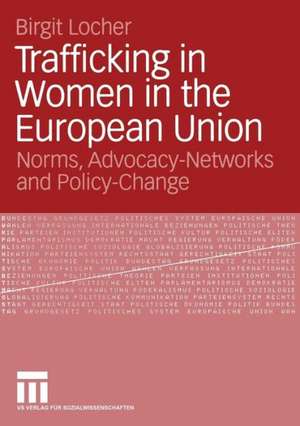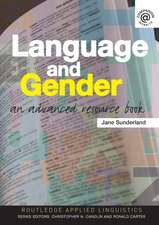Trafficking in Women in the European Union: Norms, Advocacy-Networks and Policy-Change
Autor Birgit Locheren Limba Engleză Paperback – 25 apr 2007
Preț: 394.87 lei
Nou
Puncte Express: 592
Preț estimativ în valută:
75.57€ • 78.60$ • 62.39£
75.57€ • 78.60$ • 62.39£
Carte tipărită la comandă
Livrare economică 12-26 aprilie
Preluare comenzi: 021 569.72.76
Specificații
ISBN-13: 9783810039071
ISBN-10: 3810039071
Pagini: 440
Ilustrații: XVII, 423 p.
Dimensiuni: 148 x 210 x 24 mm
Greutate: 0.58 kg
Ediția:2007
Editura: VS Verlag für Sozialwissenschaften
Colecția VS Verlag für Sozialwissenschaften
Locul publicării:Wiesbaden, Germany
ISBN-10: 3810039071
Pagini: 440
Ilustrații: XVII, 423 p.
Dimensiuni: 148 x 210 x 24 mm
Greutate: 0.58 kg
Ediția:2007
Editura: VS Verlag für Sozialwissenschaften
Colecția VS Verlag für Sozialwissenschaften
Locul publicării:Wiesbaden, Germany
Public țintă
ResearchCuprins
Norms in International Politics - Trafficking in Women and the EU: Elements of a Framework for Analysis - Actors in the 'Velvet Triangle' - Political Opportunity Structures - The Anti-Trafficking-Regime: Norm-Emergence in Historical Perspective - Trafficking and the European Community: The Silence of the Early Decades - The Extension of EU-Actions against Trafficking - The Consolidation of the EU's Anti-Trafficking Policy - Explaining Trafficking in Women in the European Union etc.
Recenzii
"Das Buch ist aus wissenschaftlicher Perspektive ein Novum, da die Autorin erstmals den Zusammenhang zwischen dem Menschenhandel und der Umsetzung von europäischen Rechtsnormen systematisch untersucht. Gleichzeitig bietet sie einen leicht verständlichen Überblick über die gesamte Spannbreite der Problematik." www.zpol.de (Zeitschrift für Politikwissenschaft), 29.07.2008
"[...] eine beeindruckende theoriegeleitete und -entwickelte Fallstudie über ein bislang kaum erforschtes Politikfeld." Femina Politica, 02/2007
"[...] eine beeindruckende theoriegeleitete und -entwickelte Fallstudie über ein bislang kaum erforschtes Politikfeld." Femina Politica, 02/2007
Notă biografică
Dr. rer. pol. Birgit Locher is political consultant and works as a researcher at the University of Tübingen.
Textul de pe ultima copertă
Trafficking in women has become a severe human rights problem in the European Union. Cur-rently the trade in human beings generates higher profits than trafficking drugs or weapons. The book describes the history and the dimension of the phenomenon in the EU. It centers around the question, when, how and why the European Union started to fight trafficking in women. The author argues that it has been due to power of international norms, successfully operating advo-cacy-networks and favorable political opportunity structures that the problem could draw public and political attention.
Caracteristici
Norms, Advocacy-Networks and Policy-Change















